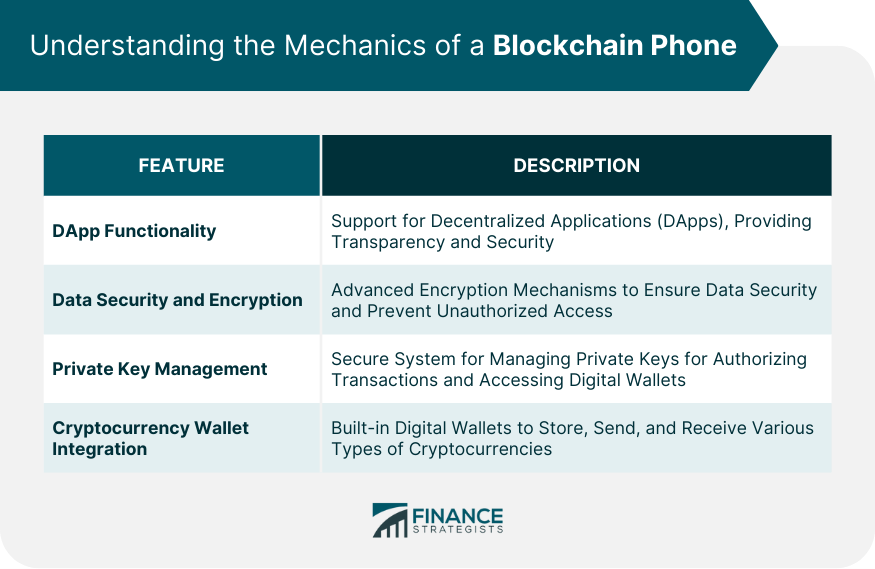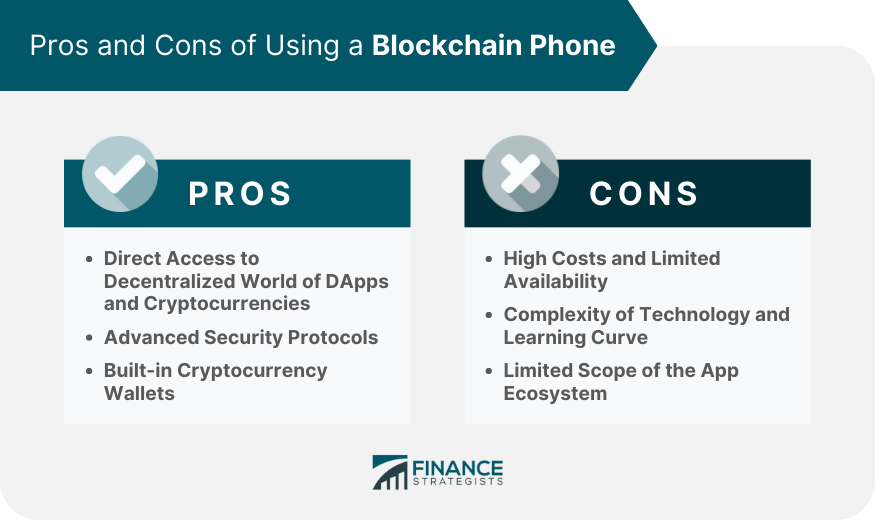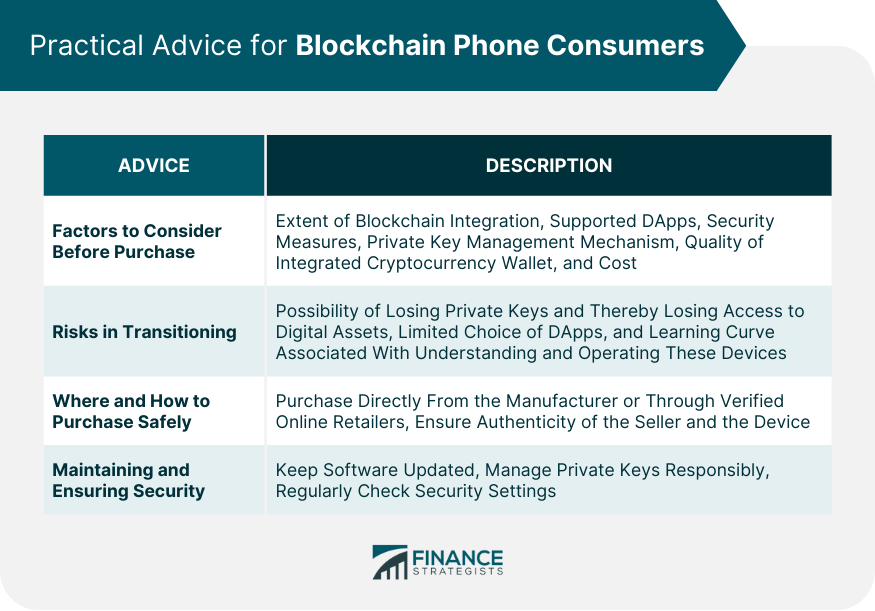A blockchain phone is a specialized smartphone designed to directly interface with blockchain technology. This design allows users to engage with blockchain-based applications, commonly known as decentralized applications (DApps), and digital assets like cryptocurrencies. The key advantage of blockchain phones lies in their heightened data security, enhanced privacy, and seamless access to blockchain services. The emergence of blockchain phones aims to bring the advantages of blockchain technology to ordinary mobile users. It facilitates straightforward interactions with blockchain services and apps, potentially revolutionizing how we understand and utilize our smartphones. With the inherent security, privacy, and decentralization features of blockchain technology, users gain more autonomy over their data and transactions. This is a significant departure from traditional centralized systems where one entity owns and controls user data. One of the most distinctive features of a blockchain phone is its ability to support decentralized applications (DApps). DApps are applications that run on a decentralized network rather than being controlled by a single entity. This structure ensures that no single party can control the information within the DApp, allowing for a high level of transparency and security. In a world where cyber threats are a pressing concern, the data security offered by blockchain phones sets them apart from conventional smartphones. Blockchain phones use sophisticated encryption mechanisms to ensure the security of data stored on the device. This means that all data on a blockchain phone is encrypted, providing a higher level of security and significantly reducing the risk of data theft or unauthorized access. Private keys are vital in the world of blockchain. They allow access to digital wallets and are required to authorize transactions. The way a blockchain phone handles these keys is of critical importance. With a security system in place to manage private keys, users can rest assured that their digital assets and transactions are well protected. Typically, blockchain phones use hardware-based solutions for private key storage to ensure they are isolated from the rest of the phone's data. An integral feature of a blockchain phone is the built-in cryptocurrency wallet. This is essentially a digital wallet that allows users to store, send, and receive various types of digital currencies. This integration simplifies the process of managing digital assets and ensures seamless transactions, making it more convenient for the everyday user to participate in the world of digital currencies. The blockchain phone's connectivity to blockchain networks offers several benefits. One of the primary advantages is the direct access it provides to the decentralized world of DApps and cryptocurrencies. This inherent connectivity facilitates a more transparent and decentralized approach to transactions and data storage, fostering a greater sense of trust and freedom among its users. Blockchain phones place a heavy emphasis on user security. These devices incorporate advanced security measures to prevent unauthorized access, thereby securing user data, transactions, and digital assets. Often, these security protocols are more robust and advanced than those found on conventional smartphones, making a blockchain phone a more secure option for those concerned about privacy and data security. The integration of a cryptocurrency wallet within a blockchain phone simplifies the process of managing digital assets. Users can manage their digital currencies directly from their devices, making transactions more convenient. This easy accessibility to digital currencies could encourage more people to enter the world of cryptocurrencies, potentially leading to more widespread adoption. Despite the myriad of benefits offered by a blockchain phone, it is not without its drawbacks. The technology and security features integrated into these phones make them costly. As a result, blockchain phones are significantly more expensive than standard smartphones, which could deter potential buyers. Moreover, the niche market for blockchain phones means that there are fewer models available, limiting the options for interested consumers. Blockchain phones introduce users to the complex world of blockchain technology, DApps, and cryptocurrencies. While these technologies offer several advantages, they can be difficult to understand for those who are not tech-savvy. The learning curve associated with operating a blockchain phone, combined with the complex terminology and concepts, may be intimidating for potential users. While the concept of decentralized applications is fascinating, it's important to recognize that the DApp ecosystem is not as vast or diverse as the traditional app markets offered by Android or iOS. There are fewer DApps available, which may limit the utility and functionality of the phone for those accustomed to a broad range of app choices on conventional smartphones. The blockchain phone market, though still in its infancy, has seen a few innovative players making notable contributions. Companies like Sirin Labs and HTC have taken the lead in introducing blockchain technology to the smartphone industry. Their efforts have set the stage for other tech companies to explore the potential of blockchain phones and have laid a foundation for future advancements in this arena. Models like Sirin Labs' Finney phone and HTC's Exodus have created a buzz in the blockchain phone market. Each model comes with its unique set of features, capabilities, and pricing. The choice ultimately boils down to the specific needs and budget of the potential buyer. A careful analysis of the various models and their offerings can help consumers make an informed decision. Potential buyers should bear in mind a few key factors before investing in a blockchain phone. They should consider the extent of blockchain integration, the range of supported DApps, the robustness of security measures, the mechanism for private key management, the quality of the integrated cryptocurrency wallet, and of course, the cost. Transitioning to a blockchain phone is not without risks. For instance, if a user loses their private keys, they risk losing access to their digital assets. Also, the limited choice of DApps could impact the functionality of the phone for some users. Not to mention the learning curve associated with understanding and operating these devices. Blockchain phones can typically be purchased directly from the manufacturer or through verified online retailers. Buyers must ensure the authenticity of the seller and the device. A new and sealed device is usually a safe bet, protecting against potential scams or counterfeit products. The maintenance of a blockchain phone involves keeping the software updated, managing the private keys responsibly, and regularly checking the security settings. Given that these devices handle valuable digital assets, maintaining their security should be a top priority for all users. Blockchain phones, with their ability to connect to blockchain networks and use decentralized applications, offer enhanced security measures and ease of cryptocurrency management. Leading players in this field, such as Sirin Labs and HTC, have introduced advanced models like the Finney and Exodus phones, respectively. However, the adoption of blockchain phones comes with potential drawbacks such as high costs, limited availability, complexity of technology, and a narrower range of available applications. Ultimately, the value of a blockchain phone is in its promise to provide users more control over their data and transactions, reflecting a shift from traditional centralized systems. If you're interested in diving into the world of blockchain, carefully consider the range of available models, their security measures, private key management, and integrated cryptocurrency wallets, alongside the cost. To ensure the secure and effective management of your digital wealth, seek expert wealth management services.What Is a Blockchain Phone?
Understanding the Mechanics of a Blockchain Phone
Decentralized App (DApp) Functionality
Data Security and Encryption
Private Key Management
Cryptocurrency Wallet Integration

Pros of Using a Blockchain Phone
Blockchain Connectivity and Decentralization
Enhanced Security Measures
Ease of Cryptocurrency Accessibility and Management
Cons of Using a Blockchain Phone
High Costs and Limited Availability
Complexity of Technology and Learning Curve
Limited Scope of the App Ecosystem

Navigating the Blockchain Phone Market: Key Players and Products
Pioneering Companies and Their Contributions
Analysis of Popular Blockchain Phone Models
Practical Advice for Blockchain Phone Consumers
Crucial Factors to Consider Before Making a Purchase
Understanding the Risks in Transitioning to a Blockchain Phone
Where and How to Make a Purchase Safely
Maintaining Your Blockchain Phone and Ensuring its Security

The Bottom Line
Blockchain Phone FAQs
A blockchain phone is a mobile device integrated with blockchain technology, supporting decentralized applications (DApps) and cryptocurrencies.
Blockchain phones allow direct access to decentralized platforms and cryptocurrencies, ensuring high data security and transparent transactions.
Key benefits include access to DApps and cryptocurrencies, advanced security protocols, and built-in cryptocurrency wallets.
Drawbacks include high cost, limited availability, technological complexity, and a smaller range of DApps compared to traditional app markets.
Notable companies like Sirin Labs and HTC have released blockchain phone models like the Finney Phone and the Exodus, respectively.
True Tamplin is a published author, public speaker, CEO of UpDigital, and founder of Finance Strategists.
True is a Certified Educator in Personal Finance (CEPF®), author of The Handy Financial Ratios Guide, a member of the Society for Advancing Business Editing and Writing, contributes to his financial education site, Finance Strategists, and has spoken to various financial communities such as the CFA Institute, as well as university students like his Alma mater, Biola University, where he received a bachelor of science in business and data analytics.
To learn more about True, visit his personal website or view his author profiles on Amazon, Nasdaq and Forbes.











